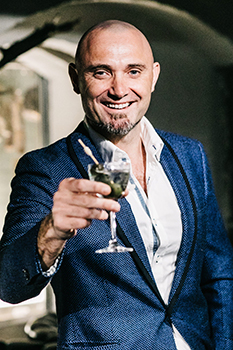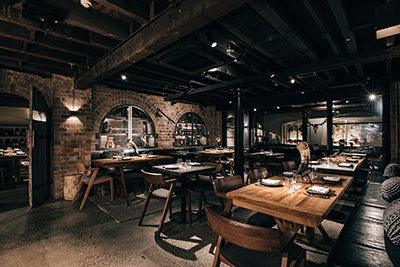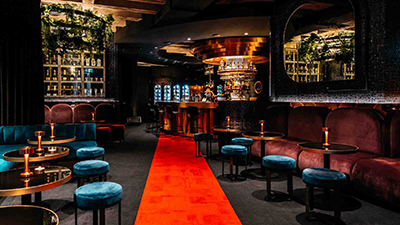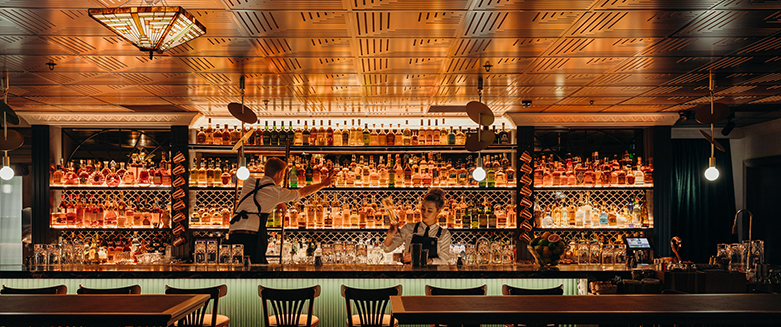This article is written by Sven Almenning: Sven is founder and CEO of the Speakeasy Group and founder of Ananas. The Speakeasy Group owns 8 venues across New South Wales and Victoria – Eau-De-Vie (Melbourne & Sydney), Mjølner (Melbourne & Sydney), Boilermaker House, Nick & Nora’s (both Melbourne), Kiss Kiss Bang Bang (Sydney) & Nick & Nora’s (Paramatta). Ananas is an online training and staff management platform for the bar and restaurant industries. Picture above is Nick & Nora Melbourne which was due to open in late March, was finally allowed to open on July 2nd and forced to close just 3 days later.
At the time of writing we have just been ordered to close all our Melbourne venues for at least six more weeks. This comes just five weeks after we slowly started re-opening them after a three month shutdown. It’s heartbreaking to say the least.

To be honest, I think the mistake that was made in Melbourne is the same mistake that is being made all over the world at the moment, and that is simply that society re-opened too early, with a myriad of confusing messages.
So far Australia has an incredible track record of suppressing the virus. In a country of 25 million people we have only had 10,425 infections and 111 deaths. That is approximately 4 deaths per 1 million people. Compared to the U.S where the fatality rate is 412 dead per million, or the UK which has recorded approximately 662 dead per million, Australia has no doubt been one of the safest countries in the world with regards to Covid-19.
However, this may be changing, as Melbourne is now witnessing our greatest spike in infections since the Coronavirus arrived in Australia back in February. There is a lesson to be learned in this. Australia was recording single digit infections for weeks, many states had experienced weeks of zero community transmissions, and we were probably 2-4 weeks away from eradicating the virus from Australia, as far as community transmissions were concerned. 2-4 weeks, and we could have returned to normal, as they have in New Zealand.
Instead there was a rush to re-open the economy.
When the virus first hit our political leaders turned to the medical professionals in the field and followed their advice: Close the borders. Isolate. Do everything you can to stop the virus from spreading through the population.
The reopening was different. Whilst the shutdown was very much led by the advice from health professionals and epidemiologists, the reopening was heavily influenced by various corporate and business interests. We opened things up too early, people started to relax, the rules became blurry and contradictory as various commercial sectors successfully lobbied for looser regulations which led to further confusion. For instance being forced to sit shoulder to shoulder on a plane, but having to keep social distancing rules at a cafe, made a joke out of the general health advice issued to the public.
As a result, the rules became confusing and people dropped their guard. Unfortunately some of the people who dropped their guard were the ones charged with protecting us from the virus. Security guards were sleeping with travellers who were quarantined in hotels, and we had examples of travellers not getting tested or quarantined when they should have been, and with them Covid-19 reared its ugly head again delivering a spike in infections and a new rise in fatalities. A couple of slip ups was all it took to bring our industry to its knees again.
However, at the time of writing we are still open and able to trade in Sydney and the rest of Australia. So, with the benefit of having reopened here are some of the insights and learnings I’ve had from the lock-down and subsequent re-opening thus far:
The Central Business District (CBD) is dead. The Suburbs are thriving
The vast majority of office workers in the cities are still working from home. This means there are very few corporates having after work drinks, or a quick dinner with mates or colleagues after work. CBD venues who often are envied for their great locations with high foot traffic and busy environment are now mostly quiet, as there are no guests around. We have one CBD venue in Sydney and we are currently only open Thursday, Friday and Saturday, and can only afford to do so thanks to the Australian Job Keeper program which helps cover some of our staff costs.
Restaurants are recovering quicker
It seems people are more willing to “risk it” by going out for dinner rather than going out for drinks. Most operators I speak to agree that their restaurants are performing way better than their bars. Some of the reasons for this are:
- In Australia we are adhering to very strict social distancing rules which have cut our legal capacities by as much as 70% in bars. Not only does this mean the atmosphere suffers, but it also means you simply don’t have enough “bums on seats” to recover financially. A 70% drop in capacity will mean a significant drop in revenue for any busy bar. Restaurants are generally more spacious in their lay-out and so their capacities are not as affected, and thus their revenue is recovering quicker
- Restaurants are also benefiting more from people’s desire to catch up on missed celebrations etc. As we still have strict restrictions on groups in venues, it makes more sense for people to book a dinner for 6-10 close friends, than organising a larger group to meet at a bar.
- In Sydney we’ve also been trading with rules that prohibit the mingling and mixing of groups and guests as well as being forced to have all guests seated. These kinds of restrictions may make sense from a public health perspective, and we are of course following all instructions, but it’s hard to make profit when trade is so heavily restricted.
Spend per head is up
One of the few positive trends is that spend per head seems to have gone up significantly. Everyone I have spoken to agrees that guests are more willing to spend money. I can only assume that this comes from either genuine sympathy with the industry or from having saved up money during a time when there was little to spend it on (this of course is not the case for the many who have gone without job or income for months).

The Media is watching
The hospitality industry is being held to far stricter conditions than other industries are, and we are being held accountable for our behaviour. Whilst other businesses seem to be able to skate past restrictions by simply having signs and sanitizers available, hospitality businesses are being inspected by both police and media for compliance. If you slip up you may not just be fined or put your team or guests at risk, you may also end up as today’s news.
Brain Drain
One of the more concerning things I have seen is a growing exodus of industry professionals leaving hospitality behind and looking for new careers. Being forced onto government support while your friends in other industries have been able to work and collect a paycheck as per normal has no doubt spooked many. However this brain drain is bad news for the industry at large. These people are the leaders and mentors for the next generation of hospo workers and their expertise is needed.
In Australia there is also a “double whammy” effect in that many of our best hospitality professionals have left the country as there was no government support for visa holders. This means that we are reopening with a huge deficit in terms of skilled staff who can work our kitchens, bars and floors.
High level of uncertainty and financial risk
For as long as Covid-19 is on high alert and for as long as transmissions remain high there is always the risk that either one of your team or your guests will get the virus. Depending on government guidelines, the time it takes to get test results and your own internal procedures, this may mean closing down your business on short notice. One infected person, staff member or guest, who could be 100% asymptomatic can be enough to close your business down for up to a week as your team gets tested and your venue deep cleaned.

There is obviously so much more that has happened and is happening as well. I don’t feel I am in a position to give advice as we are still in the middle of this, and trying to find our way, but some final comments to others in our industry, whether you are in the UK, or elsewhere are this
- Connect with and talk to other industry operators and industry professionals. I have spent a lot of time reaching out to other business owners. Some much larger than us, some smaller, and we have spent time sharing information and supporting each other. This is not the time to sit selfishly on your data and your plans. This is a time for sharing your resources and your insights with others who need it, and who may not afford the legal or financial advice you are able to pay for.
- Know the rules and make sure your team knows them as well. We use ANANAS for all our staff training and we have a COVID-19 training course that we update as things change. All staff MUST complete the training and pass the associated test before they can work in any of our venues. If inspectors come by we can pull up the record of staff who have passed our training and can also demonstrate what we train them on. It is vital that you can show duty of care when it comes to following regulations.
- Consider increasing your prices and changing your previous cost targets. Operating in a post Covid world is more expensive. Not only are there significant costs associated with the additional cleaning, the free provision of sanitizers, but also the staff and admin costs that go into managing compliance,but as mentioned before, you may also experience frequent closures where you’re cancelling bookings for hundreds if not thousands of people as a result of a guest or team member testing positive.
- Run all the worst case scenarios and ensure you have a procedure or a process in place should any occur. You don’t want to be doing last minute research and being forced to make decisions under duress when you could have planned for it with a calm and focused mind.
- If you work in or manage multiple venues, avoid cross overs as much as you can. Worst case scenario here is that a guest tests positive after visiting one of your venues, and then being forced to close not just the one venue, but several due to cross contamination between your venues.
- Embrace technology and innovation. This is the time to invest in online systems and digital tech. Whether it is online training, contactless menus or payments, or QR scanners for guests leaving their details etc, this is the time to embrace it.
- Expand your offering: many of us are going to experience a significant drop in trade as a long-term result of Covid. Look for ways to bridge that gap. Whether it’s through delivery or take away services, merchandising etc, it’s important to consider what other products and services you can add to your business in the long-term to help bring business back to pre Covid levels.
- Clearly communicate what you are doing to keep people safe from Covid and how you are complying with rules and restrictions to your guests. This installs confidence when making a reservation for your venue. We were early with our comms before closing and same before opening and many of our gusts have reached out to say “thank you”, and many have confirmed that they only felt comfortable making bookings after reading up on the various measures we are taking.
- The final piece of course is limited operating hours. Most of our venues are only trading 3-4 days a week. We have a restaurant trading 5 days at the moment, but this would not be possible without government support and rent relief from landlords.
There are tough times ahead for our industry. There is no doubt about it, but I think we should take note of and be grateful for the fact that there aren’t many governments who will be able to survive should hospitality fail. Hospitality venues are a key pillar of every community, and should we fail, there will be public outcry. Many other industries are not as lucky, so if things get tough, I am confident that most governments will step in to help. Nobody wants to become known as the person or the government who killed off the pub, bar and restaurant industry.
Stay positive & upsell like crazy,
Good Luck.
(Figures correct as of July 16th 2020)


